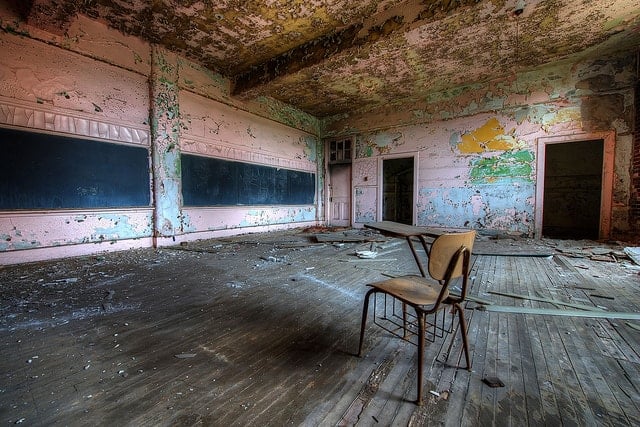I’ve spent the past two years living and working in Jesuit higher education. In that time I’ve returned again and again to a simple question: What are we doing here, and why? I think it’s a question worth asking – in education and in life – and answering it frankly and honestly is important. As Jesuits we need safe spaces to ask such questions because, ironically, we can’t be safe in the commitments our answers suggest. We have to risk everything on our answers. We have to be true – to ourselves, to others, and to the god we choose to worship. So what exactly are we doing in higher education, and why?
I have a one word answer. The word has baggage but I think we ought to say it: Conversion. We’re in the business of conversion. I’m not talking about baptizing pagan babies (those days are behind us) but rather the conversion of hearts and minds toward the needs of the poor and vulnerable. Our education seeks to convert people to a life of empathy and understanding through the insights of the creative imagination and profound intellectual inquiry. This is not negotiable. The world needs change and we all need conversion. Our commitment is a Christian one and our purpose is radically transformative. If you graduate from one of our schools unconverted we have failed you.
The dirty words here begin to multiply. Why conversion? Well, because that’s the heart of the gospel and our schools hope to serve the kingdom of God and to aid in its construction. Wait a minute. Gospel? God? Don’t worry; it gets worse. We do this as Jesuits, as members of the Society of Jesus. That’s right. Our schools exist because of our relationship with Jesus. Crazy enough for you yet? Let’s make it more so. Jesus Christ! We seek to introduce you to Christ. I know, that sounds off, imposing, just a bit ‘Jesus-freak’ weird, but bear with me. We have a strategy. It was the strategy of Jesus himself. It has something to do with love. All you need is love, right? I heard that once.
Our way is a way to know God – particularly the God of love who finds a home in our humanity, the god we call Christ. Parts of the strategy you already know: social justice and dialogue, immersion and encounter, insight and understanding. These words aren’t so scary, are they? Well, maybe that’s what’s wrong with them. They don’t ask you to change. They might make you feel better about who you are and what you do but, frankly, that’s not enough. We seek conversion because ours is a pedagogy of love and love changes things; love makes a difference.
Karl Rahner said it pretty well: “Only in love can I find you, my God.” Justice is not enough. Service is not enough. Academic excellence is not enough. Only in love will we discover the God worthy of worship and avoid the idolatry of our false gods of pride and prestige. Only in love does our work make any sense. Only in love will we be transformed. Only in love can we find a place of both acceptance and conversion, personal growth and generous self-gift. Only in love will our education be complete.
Love reorders everything. Love converts us. If you aren’t transformed then love has had no effect in your life. And we want love to have an effect in your life. That’s why, in Jesuit education, we speak always about the faith that does justice. It’s your faith we’re talking about. It’s about what you believe and what you care about; it’s about the sacrifices you’re willing to make; it’s about why you think your life is worth living.
But it’s also about our faith in Jesus. And Jesus had a strategy: Sell everything. Give it to the poor. Follow. Now keep reading before you get that AMDG tattoo, start pasting up your garage sale signs, or closing your bank accounts. More than a simple rebellious act or a hasty adoption of a religious creed, this is a guiding principle, an orientation, a standard by which to live and to learn. What you have is not yours – at least it hasn’t always been yours. You were given everything and now you are asked to give it all away. That’s it. Accept the privilege you’ve been given. Give it away. And follow.
Look to the poor and vulnerable – make their needs and priorities your own; look to them as you make decisions about how to live. Be a teacher, a lawyer, a chemist, a filmmaker, whatever, but look to the poor to understand what you should do as a teacher, a lawyer, a chemist, a filmmaker, etc. Let the outcast tell you what works and doesn’t work about this world. Look for God in the marginal places. Discover Christ in poverty (yours, theirs, and his) and follow. Accept. Give. Follow.
This strategy of conversion involves a strange kind of excellence (i.e. vulnerability) and following is certainly a strange kind of leadership, but it’s the way of Christ and it’s the way of love. Any Jesuit education worthy of the title should afford you the kind of self-possession that prepares you for ultimate (and absolute) self-donation. We want you to know yourself well enough to realize that your life is a gift, unearned and freely given. If you understand this then you’ll realize that the only way to live your life fully is to give it away unconditionally to the under-served and the un-deserving. Truly accept the gift of your life and you will understand how the way to fulfillment is generosity. To know this is to follow the way of Christ. To live this is to have experienced the conversion we seek.
***
Perhaps we don’t talk about conversion because conversion acknowledges need and vulnerability. Conversion moments aren’t moments of personal triumph as often as they are moments of personal weakness. But we need conversion moments. When I was an undergrad it seemed as if the suffering of the world was piling up around me and I was drowning in it. I felt a great need, a need that seemed to be satisfied in service. I began visiting a juvenile detention facility as a volunteer because I wanted to be helpful. In that jail my thoughts on helpfulness changed as I encountered my uselessness. It was the best thing that could have happened to me. I came to realize that the only way to stop drowning was to walk on water, that is, to risk the very thing I feared. Powerlessness.
In a strange way I felt happiest in that place not because I was being helpful but because it was a place where it made sense to feel powerless. And I needed to know powerlessness because powerlessness was true to my experience. People I loved were dying. Friends I cared about were suffering. Coping with pain drove my own addictions and compulsions to unmanageable extremes. Life was noticeably far beyond my control. The popular expectation that I couldn’t feel vulnerable, even when I was vulnerable, was smothering. Liberation came not in strength but in weakness. Freedom was found not in satisfaction but in a fundamental conversion – a kind of failure called surrender. Something happened to me and everything changed. It felt like falling in love – attractive, unsettling, and deeply consequential.
***
So this is the conversion strategy. Fall in love. Move to the lowly place, be with the lowly people, and discover humanity in those places – yours and theirs. In this place love is real. In this place you discover the only answer worth discovering. You discover your profound need of reconciliation. You discover your need of love. You discover the many ways love is abused or misused in this world. You awaken deep desires to make things more like the way they ought to be. You develop a distaste for the cynicism that insists that things continue the way they’ve always been.
More than this, you make a sacrifice. You burn your best things and in the smoke you smell an answer, a reminder of the dust. You remember that dead flesh spoils so why not live, better yet, why not burn it all and have a BBQ. You find yourself ignited. You finally come to understand the meaning of all those cathedral candles, funeral pyres, smoke-filled temples, and incensed altars. Your heart burns within you as you come to know that what is true of fire is also true of love–it changes things.
Education is not a nice thing we do. This is a strategy for conversion. This is a plan for redemption. This is a way to cash in on the gift of your life. This is a way to spend your time and energy. This is a call to prayer, to worship the only things worthy of worship – joy and justice, right-relationship and peace. This is real work. This is a call to love. This is, unapologetically, about coming to know God. This is about the gift of creation and the audacity of fidelity to that gift. Don’t let the gift expire. Don’t let the flesh rot. Burn it all. Spend it extravagantly. Be converted. Your life is a gift. Hurry up and get to the giving.
–//–
The cover image, from Flickr user Brook Ward, can be found here.



